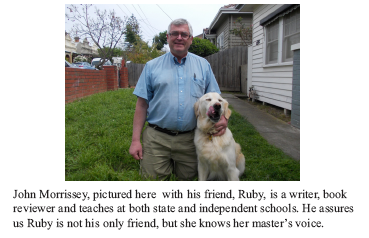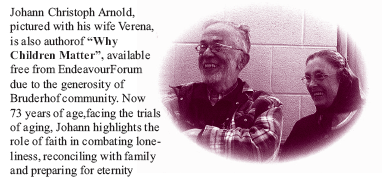Book Shelf
John Morrissey
 "Rich in Years - Finding Peace and Purpose in a Long
Life" by Johann Christoph Arnold, (Plough Publishing,
2013). Reviewed by John Morrissey. The Bruderhof
Community may donate some free copies of this book
at the Regional Event of the World Congress of Families
on 30th August 2014 in Melbourne. (See Upcoming Events for
Draft Program).
"Rich in Years - Finding Peace and Purpose in a Long
Life" by Johann Christoph Arnold, (Plough Publishing,
2013). Reviewed by John Morrissey. The Bruderhof
Community may donate some free copies of this book
at the Regional Event of the World Congress of Families
on 30th August 2014 in Melbourne. (See Upcoming Events for
Draft Program).
'Old age is golden, or so I've heard said, But sometimes I wonder, as I crawl into bed, With my ears in a drawer, my teeth in a cup, My eyes on the table until I wake up ...' (Pete Seeger)
Rich in Years gives us neither a humorous nor a morbidly fatalistic perspective on growing old, but an intensely Christian one, accepting infirmity and facing death, all with the assurance that our faith offers. "Growing old gracefully" has become a cliche, but Johann Arnold is offering advice on just that, with God's grace and the promise of heaven as the foundation of this assurance. From this perspective, he offers the reader many thoughtful insights.
The author is a senior pastor of the Bruderhof, a movement of Christian communities, and the examples which he gives of positive ageing and serene death are very often from his own experience in these communities. There, people find opportunities to do God's work by serving others, and experience care and love in their declining years. It is no contradiction to be told that we must keep active in this service for as long as possible, but not to be so independent that we shrug off care and assistance when it is offered. As he puts it, 'By allowing others to care for us, we can actually give to the giver.' And he also reminds us of the wisdom and inspiration which the aged have to offer.
If this book seems repetitive, it is because it layers numerous models of lives all pointing in this one direction, case studies drawn from his community, his family and the wider society with which Arnold has come into contact. He also quotes Mother Teresa, Martin Luther King, Pope John Paul ll, Shakespeare, Tecumseh and of course the Old and New Testaments.
"Dying with dignity" has become a battle cry for the advocates of legal euthanasia, but this message turns their notion of dignity on its head. It questions the wisdom of rebelling against the symptoms of ageing, which Arnold argues should be encountered in the spirit of adventure, with so-called indignities faced with grace and good humour. Even in the symptoms of dementia, known as Alzheimers, he points out the positive aspects, such as the return to childishness. He describes sufferers as a 'treasure', rather than ‘an experience of shame, misery and hell for those involved.' Those who care for them can learn to 'live fully in the present', treating their childish wonder as another adventure. Somewhat of a challenge for our resilience and Christian charity, perhaps?
Turning to death, Arnold focuses again on service, describing the many times when he has witnessed the peace, both on the faces of the dying and felt in the room when their lives have been spent in the service of others. He contrasts this with the dread experienced by those who have lived for themselves, the 'palpable fear' of death as 'an ugly spectre'. Jesus Himself said, "It is finished", and if we have lived a life of service and forgiveness we should have no doubt about whether we have finished what we were meant to do, for 'God will make right again whatever is broken', to quote one of Arnold’s fellow pastors.
The final chapters are concerned with Saying Goodbye, Continuing On (sic) and Beginning Anew. He cautions against needless medical intervention to prolong life, and writes about preparing ourselves to face death, forgiving and asking for forgiveness.
 For those left behind, we are told that grieving is something
to be shared, not hoarded, if it is to be a healing experience.
We are treated to some beautiful lines of Scripture,
poetry and excerpts from hymns, and reassured that even if
we die without the comfort of family and friends, Jesus is
there with us.
For those left behind, we are told that grieving is something
to be shared, not hoarded, if it is to be a healing experience.
We are treated to some beautiful lines of Scripture,
poetry and excerpts from hymns, and reassured that even if
we die without the comfort of family and friends, Jesus is
there with us.
A story which the pastor leaves us is a fitting end to this review. A doctor was on a house call, and the patient told him that he was afraid to die He asked what was "on the other side". Hearing a noise outside the door, the doctor responded. "Do you hear that? It’s my dog. I left him downstairs, but he has grown impatient, and has come up and hears my voice. He has no notion what is inside this door, but he knows that I am here. Isn’t it the same with you? You don’t know what lies beyond the door, but you know that your Master is there.
